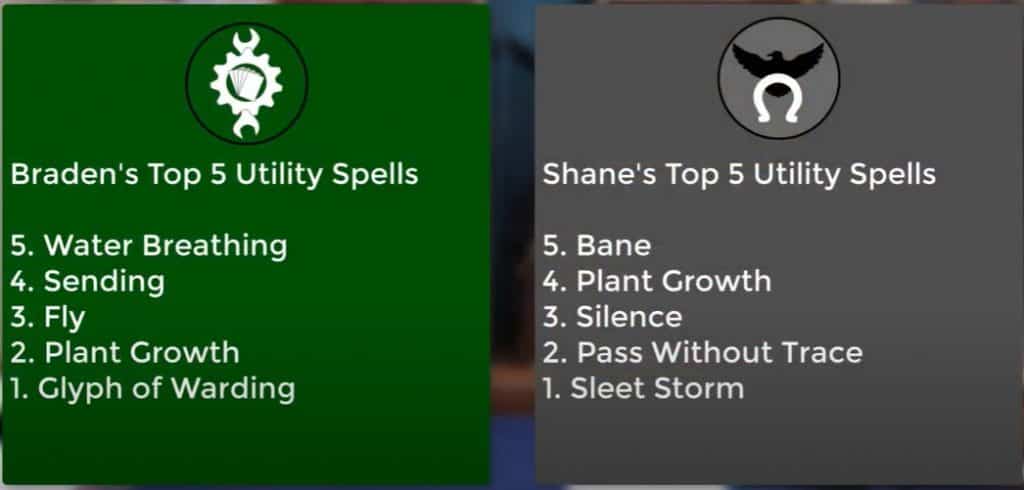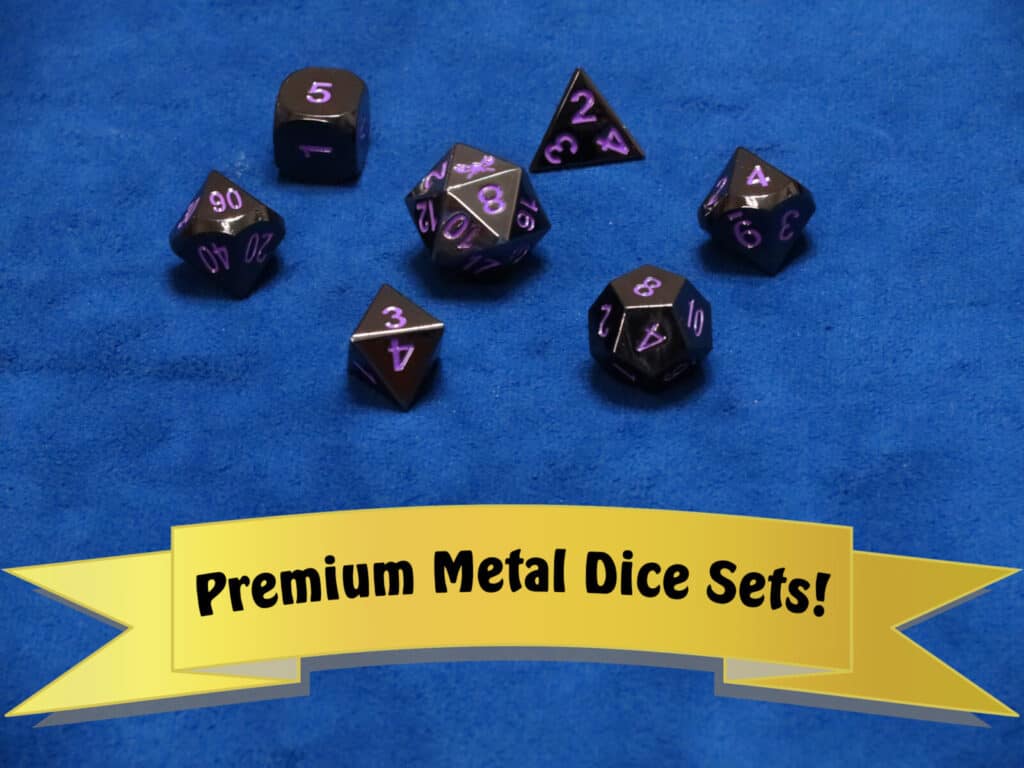The sheer variety of different spells and casting styles in 5th edition of Dungeons & Dragons gives players plenty of options when it comes to molding their casters. While offensive magic and healing magic are pretty self-explanatory, and most players have their favorites (Hello Fireball!), you could argue the real shape of your caster’s personality shows through the utility spells.
These are the spells that don’t cause direct damage, don’t directly heal, are sometimes situational and sometimes just plain useful.
Some of the best utility spells in 5th Edition D&D any player would be familiar with like comprehend languages, identify, and of course dispel/counterspell.
We’re not going to focus on those today because, well, every caster worth their salt (and even rookies who aren’t, yet) know those are important spells and probably plan on getting them, or items that give those effects.
But what about the less commonly known or used utility spells? Which ones deserve more love? Which should get more attention from casters? What hidden gems are among the best utility spells for non-caster classes?
Read on to find out, or if you’re more into listening to video, you can catch most of this at this YouTube video: (and if you like our new show please like the video and subscribe to our YouTube video, as well!)
Note: All of these spells can be found in the Player’s Handbook – grab a copy of Amazon today if you haven’t already!

Braden’s Picks for Best Utility Spells in 5E DnD
Braden looked at spells whose main function was to do something other than damage and healing. All spells are 3rd level or below (generally at higher levels you know what the crazy good utility spells are), and he wanted bang for the buck. What really changes the course of a battle? What can frequently throw off the DM’s plans? What spells just consistently come up as party savers?
These are the high-quality, low-level utility spells that are flexible, useful, and are going
#5: Water Breathing
PHB p. 287
Available to: Wizard, Sorcerer, Druid, Ranger, Artificer
Ah water, the natural enemy of any D&D party. There isn’t a gamer alive who doesn’t have a story of when the creek, river, lake or room-activated water trap managed to completely mess up, slaughter the party, or even end a campaign prematurely against all mathematical odds. Water breathing is the great equalizer to many of these hazards.
A room filling with water is one of the favorite traps of many DMs, and getting swept away by a river can cause plenty of constitution saves if you’re a dwarf in heavy armor and thus not known for swimming ability. While water breathing isn’t going to help if you find yourself heading straight towards a waterfall, this is an incredibly useful 3rd level utility spell. It is ritual, not concentration, lasts an incredible 24 hours, and can affect up to 10 people with one cast.
That usually covers even the largest party with accompanying NPCs.
There’s not much more to say about this spell. It’s incredibly useful, versatile, and if you don’t have a caster in the party with this one on their spell sheet then you had better keep an eye out for those magic items!
#4: Sending
PHB p.274
Available to: Wizard, Bard, Cleric
This is a good spell to make a plan without letting the enemy know you’re there, keep in touch with party members when they inevitably make the poor decision to “Scooby-Doo,” aka split up, this can help you when trouble inevitably shows up. Sending is one of those basic utility spells that makes communication between party members, PCs, NPCs, and even intelligent animals or creatures. This also reduces the need for sending scrolls or depending on the campaign, gives casters the ability to create more that the party badly needs.
Some spells are there because of versatility, others do one critical thing and do it very well. Sending is a spell that is going to be useful, allows flexible planning in dangerous situations, and comes in handy at some point in virtually every campaign. A must have in each party and a mainstay of utility spells for a reason.
Fun side use from personal experience: Wasting 3rd level spell slots by having one to three word conversations with a party mate, thus hilariously exasperating ( causing to be exasperated) the other responsible member of your three person D&D party.
Real conversation from past campaign:
Ben, the player: Wait, did you idiots use five sending spells with that stupid back and forth conversation?
DM Nate (laughing): Yes, they did.
Shane: (using another sending) Anything else?
Braden: Nope, we’re good.
Shane: (using another sending) Nailed it.
Braden: Good talk.
Shane: I’m out of 3rd, 4th, and 5th level spells until we rest again.
Ben: You guys are the reason I could never even try to stop drinking.
#3: Fly
PHB p.243
Available to: Wizard, Sorcerer, Warlock, Artificer
For those of us who did a lot of role playing before hitting magic-based characters, it’s easy to forget about the Z-Axis. Fly is a very straight forward utility spell without a lot of complications. Available to the conventional casting classes of wizard, sorcerer, and warlock, fly lets you avoid ground based traps, get good position for scouting, or “nope” right out of a situation where your casting character doesn’t want to be in.
This sometimes might be the only way to allow someone to survive a bad situation in battle. Ever go in a campaign where you had to go back to resurrect the party in what would otherwise be a TPK? Chances are the fly spell was a crucial part of that “Oh god, oh god, oh god,” escape plan. This is a great spell to keep your squishy casters away from heavy hitting enemy melee forces, lets you get around many traps and scouting issues if you are short a rogue or ranger in the party, and is just a quality overall spell.
Strongly recommended to have a feather fall option when using, just in case.
Plus, you know, if you have some tamed reindeer you can actually play Santa with this spell. Do you really want to miss that opportunity?
#2: Plant Growth
PHB p.266
Available to: Bard, Druid, Ranger, Cleric (Nature Domain only)
There is no utility spell that has made me more angry as a DM than plant growth. Available to Rangers, Druids, Bards, and Nature Domain Clerics, plant growth is an incredibly powerful spell in the right circumstances. This is one that, as my friend Eric puts it: “Every DM learns about this spell the hard way that first time.” I thought I had the group in trouble with a massive Spartan assault. Turns out when non-magic fighters can only move 8 feet a turn their armor isn’t that scary.
Especially when your group is 60 feet away and just going to town on them.
Needless to say, that battle did not go the way Shane the DM had planned.
This 3rd level transmutation spell only takes an action, has an incredible range of 150 feet, and any plants in the area become a thick, overgrown, difficult terrain mess. The spell specifically states 4 feet of movement for every foot moved. That means your average 30 foot speed is reduced to 7 feet a turn. 14 if they double time it. If the enemy is hard hitting or tankish instead of distance and magic based, this is utterly devastating. That’s even before you add in something like a warlock with repelling blast. Or a magic caster casting slow.
Since the plants aren’t magic, dispel magic does nothing. Once they are on the battlefield, you have to simply deal with them. Whether bogging down an enemy before destroying them, or laying the groundwork (HA!) for a hasty retreat from a bad situation, plant growth is a remarkable spell that lifts above its weight.
Plant growth is a pretty incredible utility spell, and the fact it is so widely available among your non-wizard and non-sorcerer classes just makes it that much stronger for a party. There’s a good argument to be made that plant growth is one of the most underrated utility spells in 5th Edition D&D.
#1: Glyph of Warding
PHB p.245
Available to: Wizard, Cleric, Bard, Artificer
Admittedly, this is a spell that sees a lot of use for its potential damage and trap components. This is because it can be so devastatingly effective in that
Rules Note: This is a spell that gets some controversy on use with the phrase “If the surface or object is moved move than 10 feet from where you cast this spell, the glyph is broken, and the spell ends without being triggered.” Some people have claimed that this means you can’t move an object once the glyph has been set.
So you can ward a book in your base or some stones in a set location but if you move them, it’s gone. The trouble is this doesn’t make a lot of sense when looking at books, scrolls, and armor being used as examples of things to put glyphs on. If the glyph is in a book then that’s where it’s cast therefore you should be able to move the book. It only gets dispelled if you tear out the page or cover with the glyph on and then move away.
It’s technically an on-going argument, but the rule of fun seems to prevail and I haven’t been at a table where it’s used this way. Otherwise why would it be a third level spell so heavily neutered and restricted? So talk to a DM about this, most more or less ignore the literal reading on this of 10 feet being the absolute spot.
Also worth noting: glyph of warding is often used as an offensive damage dealing spell but if instead of going explosive runes you go with spell glyphs, this can really turn to the utility side of things in a big impressive way. Load them up on a fighter’s armor that never leaves his side. Once it’s hit, it unleashes haste, fly, and invisibility with one hit. Plenty of options.
This is the work around around the “one concentration spell at a time” limitation in D&D and for wizards who take the time to prepare, makes them an insane force that allows the party to punch well above their weight even many levels beyond level 3.
I mean we’re not keeping score comparing these two lists (though if we were Shane would win due to penalty flag on the damage ability of this spell).

Shane’s Top 5 Underrated Utility Spells (3rd Level or Less)
Shane’s methods for choosing top utility spells follows his personality of loving the lesser known options – or finding creative ways to use widely known spells differently than what most other players do. All utility spells are also 3rd level or less, are often easily passed over or not given the full respect they deserve, and interestingly enough, most of these best utility spells aren’t available to wizards, warlocks, or sorcerers.
In other words, these are spells that can often be used by other members of the party to bring an entirely new level of battlefield control, party support, or general chaos to the table while letting the more traditional casters focus on hurling major damage, or specializing their casting style for maximum effect.
There was one spell that landed on both lists as one of the best low level utility spells out there (it was impossible to ignore based on both of their experiences)
#5: Bane
PHB p.216
Available to: Bard, Cleric
A far too often overlooked utility spell for bards, bane is far more effective in reality than common sense would tell you when in actual use. Clerics can be forgiven for overlooking bane as yet another monk or fighter yells for a medic after unwisely charging head first into battle, but for a low level bard to be able to utterly change the landscape of a battle – that’s powerful.
Bane has several benefits you don’t see too often from low-level utility spells in 5e. For one, it can affect multiple enemies. Usually you’re not facing a 10 on 3 type fight early on as a DM is warming you up to a campaign. This means many early battles will be three or four enemies max, and chances are also high that they’re not the charismatic types.
This is a charisma save when the bard is casting, making enemies more likely to fail as CHR is probably a dump stat for them.
This spell is (sometimes awkwardly) described as the first kiss in Shane’s love affair with the bard class in fifth edition D&D, and although it looks underpowered in print, in reality it is a surprising just how often those d4 rolls literally make the the difference between a hit and a miss or a save or a fail. It looks underwhelming on paper, and so often it is overpowering in the actual campaign.
This is a FIRST level utility spell that scales up. Not only does this make it one of the better low-level utility spells for bards, but in my book it makes it one of the best first level spells, period. That makes for some serious battlefield control for very little expended effort.
In fact, this spell is so effective in 5th Edition that we even created a 5E Bane Spell Guide. If you want to know more, head on over!
#4: Plant Growth
See earlier section covered in Braden’s list of most powerful utility spells. Yeah, plant growth is a utility spell that can do some serious, serious work. It’s ruined more than one of my crazy boss battles when I wasn’t prepared as DM.
#3: Silence
PHB p.275
Available to: Cleric, Bard, Ranger
I tend to think of this as a ranger spell since that’s the only time I actually used it in a campaign, although bards and clerics have full access to this second level utility spell, as well. From the school of illusion magic, silence can cause some potential headaches to its own caster, not the least of which is forgetting which spells they can or can’t cast because of the verbal component.
Silence is a great utility spell that can silence a watch guard before they can sound the alarm, be cast on your own party while attempting a stealth check, or even make all of you thunder proof against a wizard, sorcerer, or enemy who really likes that thunder damage. Committing a heist? Cast silence. Need to shut up a caster from a distance? Cast silence.
Does your own party caster get charmed? That is a VERY good time to cast silence. In addition, it can be cast as a ritual spell. That makes it all the more versatile as a low level spell, and a great utility spell that is outside of your conventional wizard/sorcerer class.
#2: Pass Without a Trace
PHB p.264
Available to: Druid, Ranger
Also known as the first ranger spell I actually paid attention to in my first campaign, Pass Without A Trace is arguably the most underrated utility spell out there, period. The shennanigans I’ve pulled with this spell certainly puts it in the memory of about any table I’ve ever sat at. This is such an overpowered 2nd level D&D spell. As a utility spell it’s so useful for so many situations.
Obviously super stealth is great. Add this to a ranger or rogue with high stealth skills (which should be all of them) can put an even bad roll into ridiculously hard to spot territory. On top of a 19 this can make them all but invisible. This is a great spell that allows the entire party to be relatively (or very) stealthy. Even the heavy armor plated cleric or fighter has a better than fair chance of getting a good check with this level of a bonus.
Pass without a trace allows a character and any creature within 30 feet the caster wants to make super stealthy with a +10 to all stealth checks and can’t be tracked other than by magic. This is a concentration spell, meaning it can go down, but if you’re a druid or a ranger with +10 to stealth and manage to get spotted and hit…it was probably meant to happen.
Pass without a trace is useful in so many situations. What D&D campaign doesn’t have sneaking, distractions, heists, or pranks? Pass without a trace can also give an extra edge to the rogue looking for sneak attack or a party trying to redefine the battle field by ducking behind cover and then making a stealth check before repositioning.
This is one of the strongest low level utility spells of the game and the fact that one of your main casting characters is not the one using it makes it even more valuable to a party.
#1: Sleet Storm
PHB p.276
Available to: Wizard, Sorcerer, Druid
Sleet storm is known in many groups as “that spell that would be amazing if it did damage.” While it makes sense that you expect some damage to come from a spell with the word “storm” in it, the truth is that sleet storm is one of the best low level utility spells out there. Even the druid class, a class full of great useful utility spells, will profit from making sure to grab sleet storm as one of their spells – and not just because of the natural way it fits into roleplay.
While I get the argument that this is a spell that should do at least a little damage, there’s a good reason to still consider it as part of the rotation.
Just look at all the things this spell includes:
- Difficult terrain 40 foot in every direction from the center of the cast
- Forced concentration saves for all casters (spell specifically says Constitution save, to boot)
- All open flames/fires are put out, bringing darkness and night vision into play
- Dex-saving throws to avoid falling prone
- Spell is twenty feet up meaning low flying or floating casters are also hit
- This is an on-going effect, meaning all times entering the sleet storm require a dex save and all turns spent in the storm require a con-save to keep a spell going
- Heavily obscured visibility
Considering a lot of these stack, and enemies or NPCs don’t know where the center of the spell is, there’s a good chance they get hit by several of these, possibly at once. Casters need to struggle not to lose their spells. In a confined space if they cast a concentration spell, they still need to make that save next turn. A lot of NPCs may fall prone, making it hard to do anything because of the ice, and even if they get up all of that space is difficult terrain making it hard to move. Just going to fly? Look at that concentration save.
Great for causing chaos, creating an escape route, or letting your party concentrate on one or two figures while putting the others in a storm, this spell can be an escape plan, it can be chaos into a bad situation battle, it can give you the edge for a party with good night vision when dealing with NPCs who don’t have it (especially if it’s night or you’re in a cave – all those torches go out).
For DM’s who add a degree of “common sense” to saves, this spell is going to do even more than listed. Trying to shoot an arrow on ice? Let’s make sure you have your footing first. Trying to shoot through obscure vision? That will be disadvantage. Is your party sending a rogue around the edge of the spell to steal something? He definitely has advantage on the stealth check and any NPC trying to spot him out of the sleet storm almost certainly has disadvantage…if the DM even allows the attempt.
This is a heavy duty utility spell that is overlooked far too often. Yeah, I’d like to see it get even nominal cold damage, but even without it, this is a really amazing utility spell for 5th edition D&D.
Add in Braden’s favorite of “Glyph of Warding” to be set off with sleet storm and there you go, you get your damage to boot 🙂

The Best 5E Utility Spells in D&D: In Conclusion
This also may be a good time to point out that with the Magical Secrets trait of a College of Lore Bard that technically the Bard can learn every single one of these spells, even if they aren’t bard spells. Made more sense to mention that here than under every single listing. Though bards aren’t lacking from great spells to choose from.
With this group of best 5e utility spells you aren’t going to have a lack of things to do. From super specific situations to dodging the most deadly of DM traps to causing chaos and shaping the battlefield to your will, these spells do some serious work.
Not all spells need to be mix-maxed for healing and damage. With an array of these available to your character, or your party, you will be ready for whatever even the most Braden-like or Shane-like of DMs are going to throw at you.
Thank You for Your Wonderful Support!
We appreciate the wonderful support from our readers and viewers. If you want to show your thanks as we work to support ourselves while creating this great content, feel free to Support us on Patreon or if you’re looking at expanding your collection of dice and cool DnD stuff, take a look at the picture below and consider buying from Skullsplitter Dice through our affiliate links

Thanks for reading, and thank you for your support!
Other RPG Articles You May Love
- Most overpowered feats 5E dnd
- Arcane focus vs Components pouch
- Alert Feat 5E: Complete Guide
- Sorcerer vs. Wizard 5E
- Why is Gloomhaven so expensive?
- Best Bard Feats 5E

Proud to embrace the locally created moniker of “Corrupt Overlord” from one of the all time great Lords of Waterdeep runs, Shane is one member of the Assorted Meeples crew and will be hard at work creating awesome content for the website. He is a long-time player of board games, one time semi-professional poker player, and tends to run to the quirky or RPG side of things when it comes to playing video games. He loves tabletop roleplaying systems like Dungeons & Dragons, Pathfinder, Werewolf, Fate, and others, and not only has been a player but has run games as DM for years. You can find his other work in publications like Level Skip or Hobby Lark.
